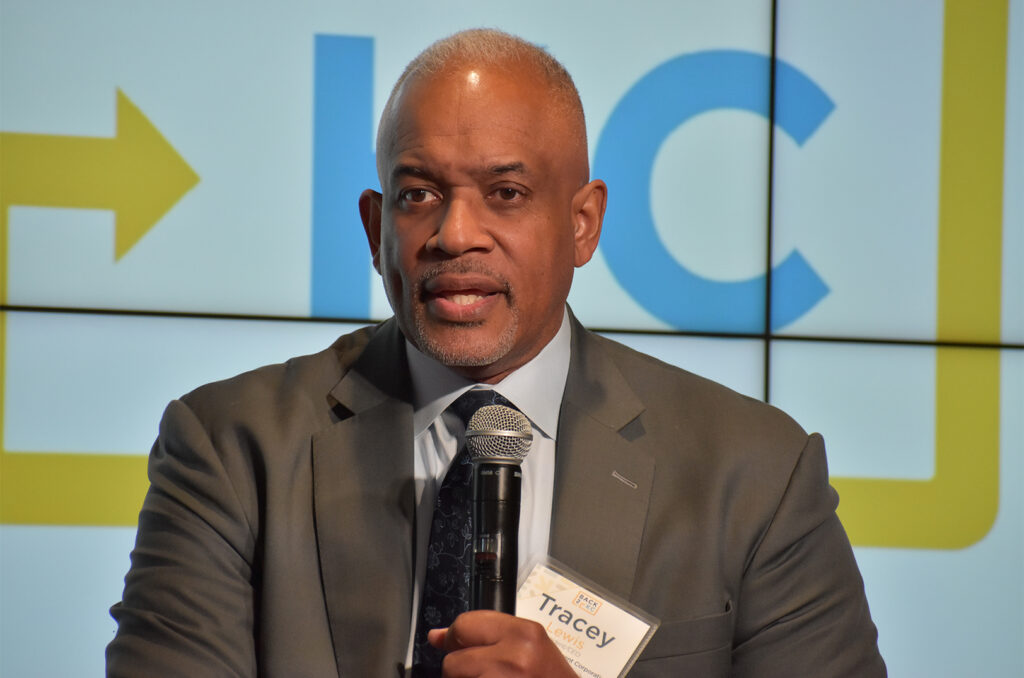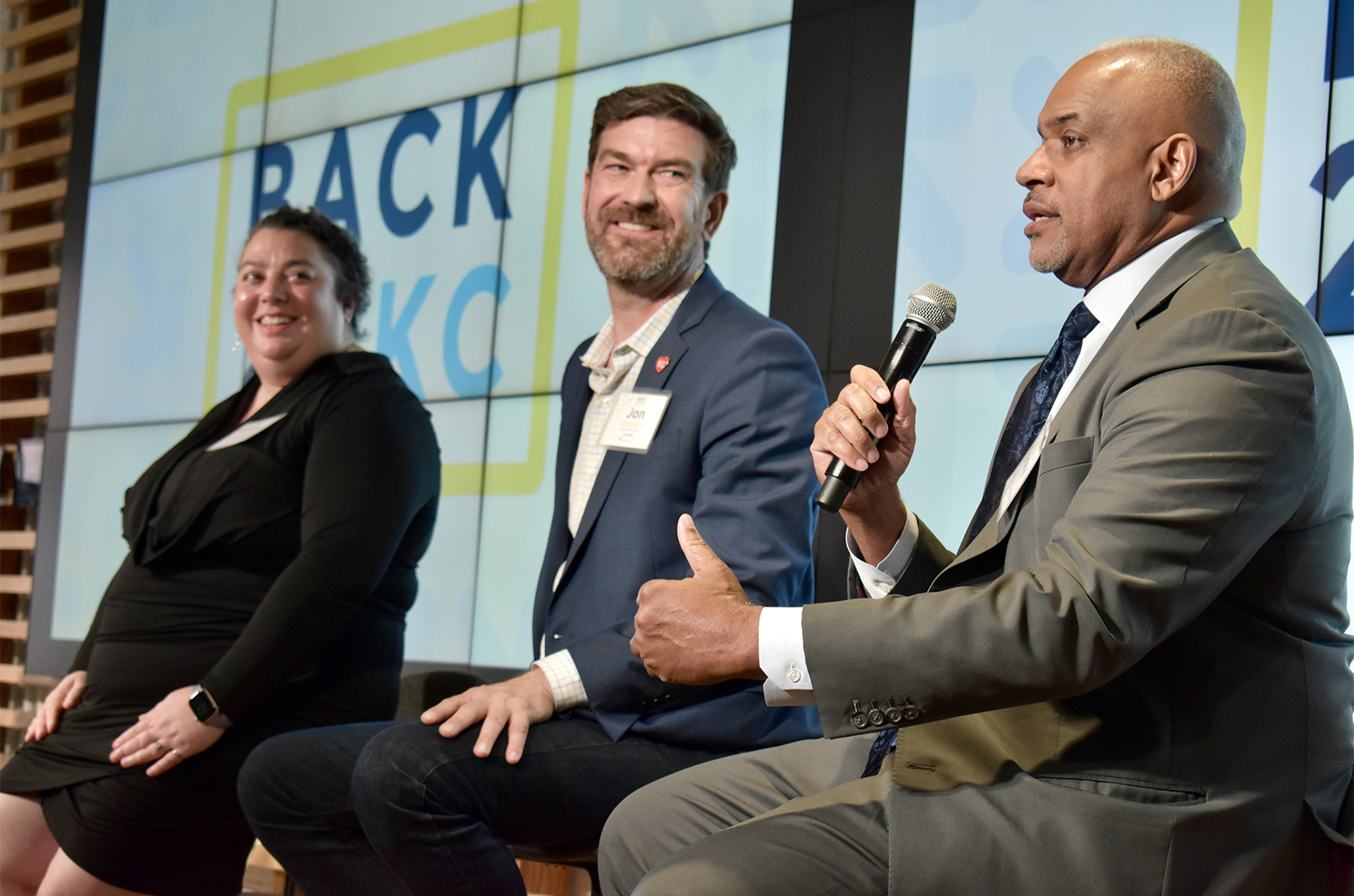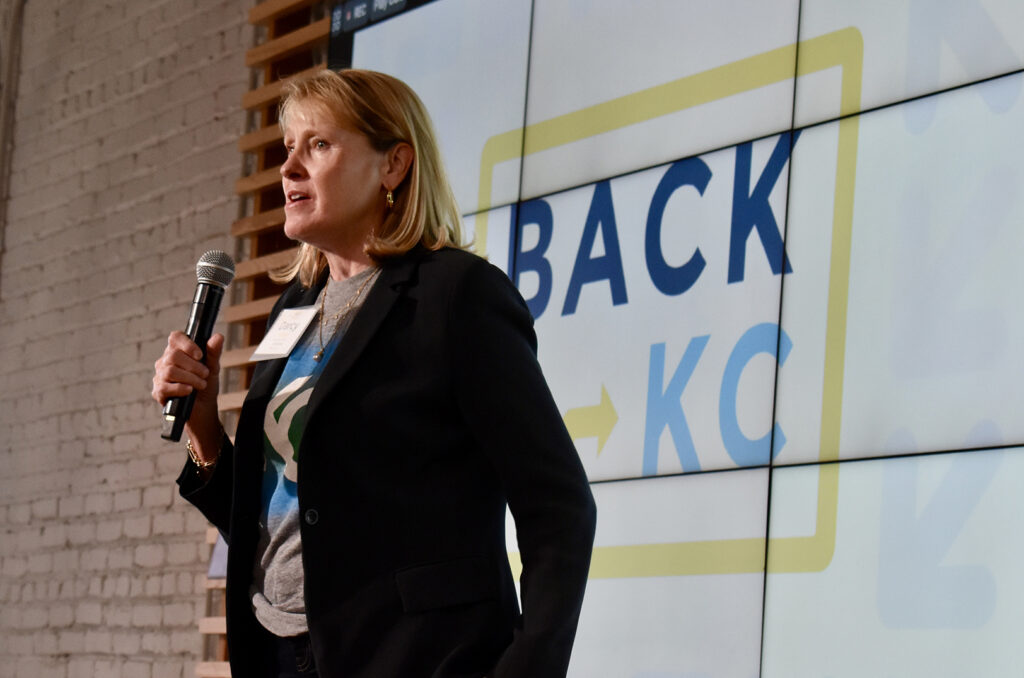Downtown baseball remains a winning prospect for Kansas City — and the Royals — civic and business leaders told a crowd of former residents who are considering a move back to KC, encouraging them to imagine a homecoming of big league proportions.

Jon Stephens, president and CEO of Port KC, speaks during a panel conversation at Back2KC at SafetyCulture in the Crossroads; photo by Taylor Wilmore, Startland News
“I think everyone agrees that Major League Baseball is a downtown sport,” Jon Stephens, president and CEO of Port KC, said during a Back2KC panel conversation Friday that touched on how new developments throughout the city are reshaping its economic and cultural future. “If you want to talk about an ecosystem, cities thrive with downtown baseball.”
A plan to relocate the Kansas City Royals from the Truman Sports Complex east of downtown to the Crossroads Arts District was scuttled earlier this year when a crucial sales tax initiative failed with voters. Conversation was reignited in late August by an independently drafted proposal from a consortium of business owners to transplant the stadium next to Crown Center and Union Station at Washington Square Park.
Royals representatives have consistently said the club is continuing to explore all options.
Stephens — alongside fellow panelists Tracey Lewis, president and CEO of the Economic Development Corporation of Kansas City, and Melissa Roberts Chapman, president and regional innovation officer for KC BioHub — said he’s “bullish” on Kansas City finding a way to incorporate baseball into its iconic skyline.
“Kansas City needs downtown baseball. The Royals need downtown Kansas City. I think something is going to happen,” he continued. “But it needs to be done the right way — in a way that truly helps and contributes to the city in a meaningful way.”
“Ultimately, the city, the Royals, and all the partners want the deal to work and I think that’s the biggest thing that the community needs to understand,” Lewis added, broadly alluding to previous rumors that talks between the ball club and local leaders had dissolved, leaving space for the team to move elsewhere. “There’s no agitated friction among the partnerships. It’s just that the right deal hasn’t evolved. But it will, because it’s something that we all collectively appreciate needs to happen downtown in a way that helps the team. We’ll get there.”
The community’s swing for downtown baseball was among topics explored during a day-long Back2KC event organized Friday by KCRise Fund — a years-long initiative launched in 2018 by founder Darcy Howe to rekindle connections between former Kansas Citians and the city’s startup ecosystem.
Hosted largely at SafetyCulture’s U.S. headquarters in the Crossroads, Back2KC welcomed about 20 expats — hailing from a range of Washington, D.C. to Redmond, Washington — and 10 new-to-Kansas Citians for its 2024 gathering. Programming sessions ranged from sports to startups, curated networking, and community spotlights aimed at highlighting Kansas City as a place to live, start and grow.

Tyler Enders, co-founder of Made in KC, joins in a conversation on the future of downtown baseball during a 2024 Back2KC event; photo by Nikki Overfelt Chifalu, Startland News
Adding to the draw: the Royals ownership group is among those who want to build in Kansas City, said Tyler Enders, moderator of the panel and co-founder of local-first retailer Made in KC.
“There have been other cities that have offered hundreds and hundreds of millions of dollars [to the Royals] to say, ‘We’ll help you build a stadium,’” he explained. “But the ownership team isn’t interested in that. So that’s one of the really special things about Kansas City — whether you’re trying to create a small business that’s one single coffee shop or whether you’re trying to do big ballpark projects — it is really relationship-driven.”
The value of relationships and collaboration in Kansas City was a theme weaved throughout the panel discussion and Back2KC’s core messaging.
“‘Kansas City nice’ can be pejorative — like they don’t really tell me the real truth to my face — but it also can be really what we are, which is we work really well together,” noted KCRise Fund’s Howe, who emceed the event. “The silos I’ve seen in other states and cities are shocking to me, especially in the Midwest.”
“I think as you all look to return and consider Kansas City, it really is the collaboration — coupled with hard work and innovation — which is always going to flourish here in Kansas City,” added Stephens.
The future is as bright for entrepreneurs as sports fans, panelists said, citing abundant opportunities and resources available.

Melissa Roberts Chapman, president and regional innovation officer for KC BioHub, center, discusses Kansas City economic opportunities during a 2024 Back2KC event; photo by Nikki Overfelt Chifalu, Startland News
Now is the time to start or move biotech companies to the area, Roberts Chapman explained — noting, “It’s not going to get cheaper” — and to explore solutions to supply chain challenges, particularly as they fold into the region’s burgeoning biotech and digital health corridor.
“There are so many supply chain needs that aren’t deep biotech that are going to influence this industry,” Roberts Chapman said, drawing upon local crossover opportunities between companies. “(Enders) talked about petri dishes, kind of jokingly, but it’s actually not a joke at all. We need a glass manufacturer who’s going to create petri dishes with 370 or higher walls for a startup we have here called Ronawk.”
“That kind of component manufacturing opportunity is out there,” she added. “It’s lucrative and all it takes is a little bit of financing to buy out an existing manufacturing business — of which there are many in the region — to take advantage of this opportunity.”
Stephens agreed with the vastness of innovative manufacturing potential in Kansas City — and not just in biotech — like HVAC systems within data centers.

Tracey Lewis, president and CEO of the Economic Development Corporation of Kansas City, right, speaks during a 2024 Back2KC event at SafetyCulture in Kansas City’s Crossroads Arts District; photo by Taylor Wilmore, Startland News
The biggest opportunity, Lewis noted, is to be the supplier of specialized services like warehousing, transportation, and human resources.
“In the heritage of Kansas City — when people were going west, they stopped at Westport to get grain and clothes and all those things — that same opportunity will evolve,” he explained, referencing one of Kansas City’s historic commercial neighborhoods that has transformed through the decades but remains a critical element for the business community.
RELATED: Check out one piece of a seven-business expansion project coming to Westport.
“This is our new growth renaissance in Kansas City. And if all boats are going to rise, all areas of need will have to be addressed — instead of just the ones that are the glitzy, sexy industries in Kansas City,” Lewis continued. “It truly is the time to be here.”








































